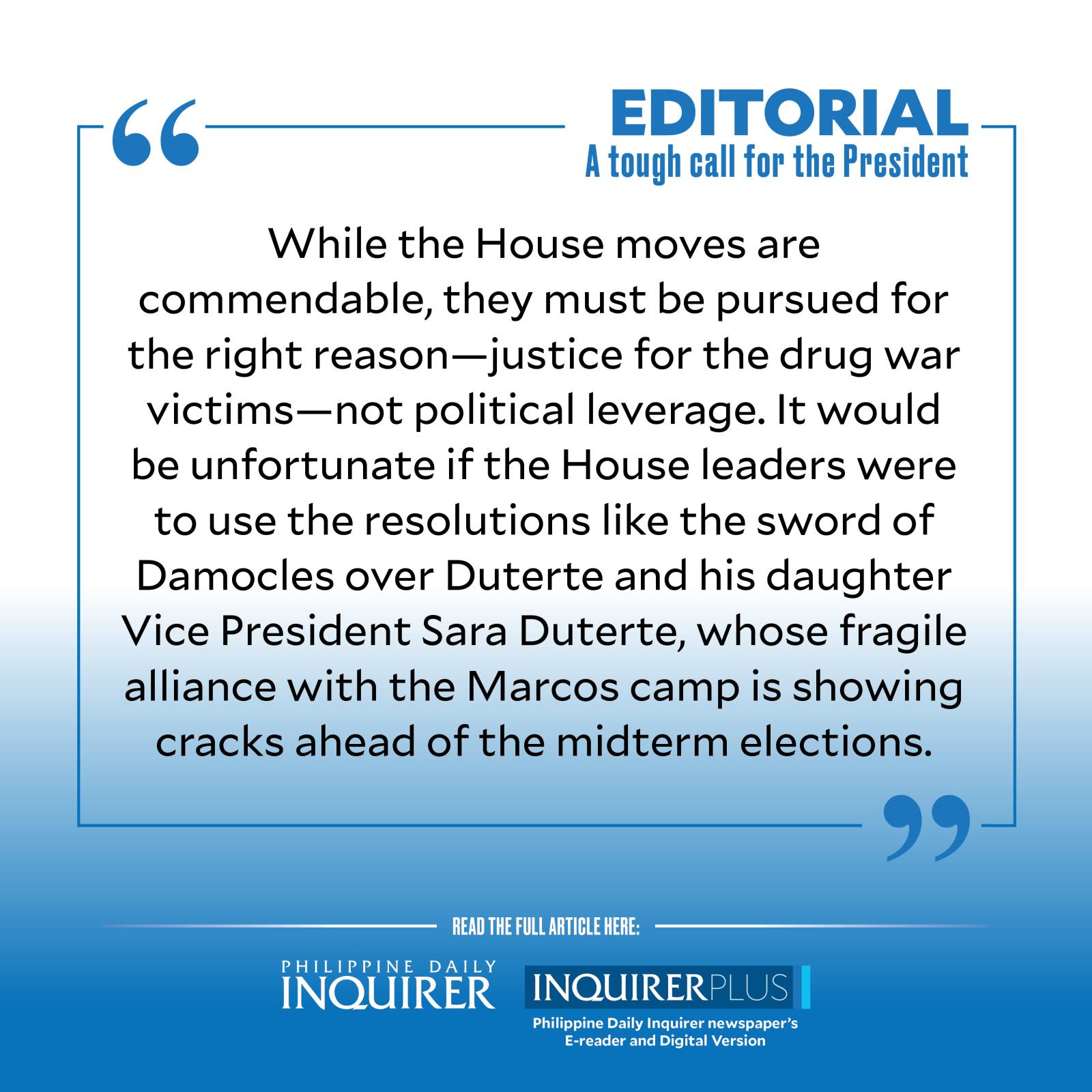A tough call for the President

The proof of the pudding is in the eating” may well describe the general reaction to the bold move in the House of Representatives to formally ask the Marcos administration to cooperate with the International Criminal Court (ICC) in investigating the thousands of killings committed during former president Rodrigo Duterte’s bloody war on drugs.
Is this for real? Are they serious, or is it part of political play?
Three resolutions seeking to allow the ICC probe were adopted after a joint hearing of the House committees on justice and on human rights on Wednesday. They were filed by human rights panel chair Manila Rep. Bienvenido Abante Jr., a member of the majority, 1-Rider party list Rep. Ramon Rodrigo Gutierrez, Albay Rep. Edcel Lagman, and the Makabayan bloc, a rare bipartisan move on such a sensitive issue.
“Cooperating with the ICC underscores our commitment to upholding human rights. We recognize that a fair and impartial investigation is essential to address allegations of human rights abuses,’’ Abante said of the resolutions’ intent.
Surreal development
Adding to the surreal development is President Marcos’ not so subtle switch from his previous stance flatly rejecting government cooperation in the ICC probe of his predecessor’s crimes. In July, following the Hague-based body’s denial of the government’s appeal to stop the investigation, the President declared: “We’re done talking with the ICC. Like what we have been saying from the beginning, we will not cooperate with them in any way, shape, or form.”
Last week however, Mr. Marcos said the House resolutions were “not unusual,” and that the lawmakers were “just expressing or manifesting the sense of the House that perhaps it’s time to allow or to cooperate with the ICC investigation.’’ He added: “There is also [the] question: ‘Should we return under the fold of the ICC?’ So that’s again under study. So we’ll just keep looking at it and see what our options are.”
It’s definitely a welcome pronouncement for the families of drug war victims, as well as the ICC which continues to assert its jurisdiction over the murders committed prior to March 17, 2019, when the Philippine government’s withdrawal from the Rome Statute that created the ICC took effect.
Covered by the ICC investigation are drug war killings since Nov. 1, 2011, until Duterte ordered the country’s withdrawal from the body.
Sword of Damocles
Exciting developments, certainly, but it would be wise to temper our expectations.
Because while the House moves are commendable, they must be pursued for the right reason—justice for the drug war victims—not political leverage. It would be unfortunate if the House leaders were to use the resolutions like the sword of Damocles over Duterte and his daughter Vice President Sara Duterte, whose fragile alliance with the Marcos camp is showing cracks ahead of the midterm elections.
Admittedly, Duterte may have provoked the move after he went after the House, led by Mr. Marcos’ cousin, Speaker Martin Romualdez, following its rejection of the P650 million in confidential funds that his daughter had requested for 2024.
Let’s not ignore the limits of House resolutions either, including that filed at the Senate by Sen. Risa Hontiveros. They are, Mr. Marcos himself pointed out, merely expressing the “sense” of the chamber.
Further, the House resolutions did not define the parameters of cooperation with the ICC. Will the ICC be allowed to come into the country, interview witnesses, and obtain evidence? Or will it otherwise be asked to limit its probe using only official documents released by the government?
Real reckoning
And what of the ICC’s reaction to all these? It has so far been silent on what comes next after its Pretrial Chamber 1 allowed its prosecutor to resume investigation in January. The ICC has always maintained that the investigations being conducted by the Philippine government “do not amount to tangible, concrete, and progressive investigative steps in a way that would sufficiently mirror the Court’s investigation.’’ It noted that the cases supposedly under investigation “reflect only a fraction of [extrajudicial] incidents and mention only low-level perpetrators.’’
Reinstating membership to the ICC might be a tricky for Mr. Marcos as he might think of his own immunity after he steps down from office. Thus, the bare minimum for the government is to heed calls for cooperating in the current ICC investigation.
The House resolutions also put Mr. Marcos in a tight spot. For the real reckoning comes if and when the tribunal moves to go for the arrest of Duterte and his key lieutenants. Will the President choose to save his alliance with the Dutertes in a bid to cover all his bases in the coming 2025 elections? Or will he rise to the occasion and give the drug war victims the justice they deserve?
It is a tough call, and a moral one—one that would surely test the mettle of the Chief Executive, while also revealing the country’s future in the next few years under him.
















